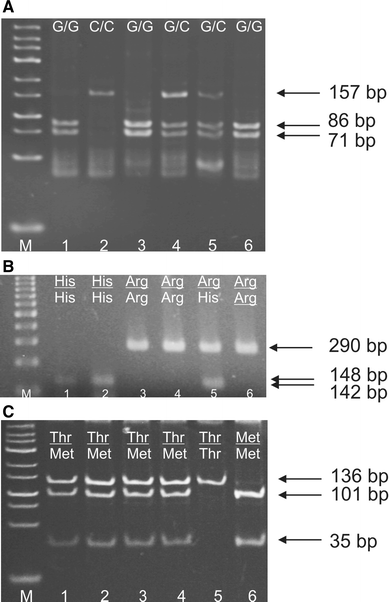Polymorphisms in RAD51, XRCC2 and XRCC3 genes of the homologous recombination repair in colorectal cancer--a case control study
- PMID: 21104022
- PMCID: PMC3071932
- DOI: 10.1007/s11033-010-0430-6
Polymorphisms in RAD51, XRCC2 and XRCC3 genes of the homologous recombination repair in colorectal cancer--a case control study
Abstract
XRCC2 and XRCC3 proteins are structurally and functionally related to RAD51 which play an important role in the homologous recombination, the process frequently involved in cancer transformation. In our previous work we show that the 135G>C polymorphism (rs1801320) of the RAD51 gene can modify the effect of the Thr241Met polymorphism (rs861539) of the XRCC3 gene. We tested the association between the 135G>C polymorphism of the RAD51 gene, the Thr241Met polymorphism of the XRCC3 gene and the Arg188His polymorphism (rs3218536) of the XRCC2 gene and colorectal cancer risk and clinicopathological parameters. Polymorphisms were evaluated by restriction fragment length polymorphism polymerase chain reaction (RFLP-PCR) in 100 patients with invasive adenocarcinoma of the colon and in 100 sex, age and ethnicity matched cancer-free controls. We stratified the patients by genotypes, tumour Duke's and TNM stage and calculated the linkage of each genotype with each stratum. Carriers of Arg188Arg/Me241tMet, His188His/Thr241Thr and His188His/G135G genotypes had an increased risk of colorectal cancer occurrence (OR 5.70, 95% CI 1.10-29.5; OR 12.4, 95% CI 1.63-94.9; OR 5.88, 95% CI 1.21-28.5, respectively). The C135C genotype decreased the risk of colorectal cancer singly (OR 0.06, 95% CI 0.02-0.22) as well as in combination with other two polymorphisms. TNM and Duke's staging were not related to any of these polymorphisms. Our results suggest that the 135G>C polymorphism of the RAD51 gene can be an independent marker of colorectal cancer risk. The Thr241Met polymorphism of the XRCC3 gene and the Arg188His polymorphism of the XRCC2 gene can modify the risk of colorectal cancer.
Figures

Similar articles
-
Correlation between selected XRCC2, XRCC3 and RAD51 gene polymorphisms and primary breast cancer in women in Pakistan.Asian Pac J Cancer Prev. 2014;15(23):10225-9. doi: 10.7314/apjcp.2014.15.23.10225. Asian Pac J Cancer Prev. 2014. PMID: 25556451
-
Single nucleotide polymorphisms in the homologous recombination repair genes and breast cancer risk in Polish women.Tohoku J Exp Med. 2011 Jul;224(3):201-8. doi: 10.1620/tjem.224.201. Tohoku J Exp Med. 2011. PMID: 21701125
-
The association between polymorphisms of the RAD51-G135C, XRCC2-Arg188His and XRCC3-Thr241Met genes and clinico-pathologic features in breast cancer in Poland.Eur J Gynaecol Oncol. 2012;33(2):145-50. Eur J Gynaecol Oncol. 2012. PMID: 22611952
-
XRCC3 Thr241Met polymorphism and gastric cancer susceptibility: a meta-analysis.Clin Res Hepatol Gastroenterol. 2014 Apr;38(2):226-34. doi: 10.1016/j.clinre.2013.10.011. Epub 2013 Dec 4. Clin Res Hepatol Gastroenterol. 2014. PMID: 24315014 Review.
-
Association between XRCC2 Arg188His Polymorphism and Breast Cancer Susceptibility: A Systematic Review and Meta-Analysis.Asian Pac J Cancer Prev. 2024 Jan 1;25(1):43-55. doi: 10.31557/APJCP.2024.25.1.43. Asian Pac J Cancer Prev. 2024. PMID: 38285766 Free PMC article.
Cited by
-
XRCC2 Polymorphisms and Environmental Factors Predict High Risk of Colorectal Cancer.Med Sci Monit. 2018 May 7;24:2858-2863. doi: 10.12659/MSM.904935. Med Sci Monit. 2018. PMID: 29748531 Free PMC article.
-
XRCC2 gene polymorphisms and its protein are associated with colorectal cancer susceptibility in Chinese Han population.Med Oncol. 2014 Nov;31(11):245. doi: 10.1007/s12032-014-0245-8. Epub 2014 Oct 11. Med Oncol. 2014. PMID: 25304007 Clinical Trial.
-
Haplotype analysis of XRCC2 gene polymorphisms and association with increased risk of head and neck cancer.Sci Rep. 2017 Oct 16;7(1):13210. doi: 10.1038/s41598-017-13461-6. Sci Rep. 2017. PMID: 29038438 Free PMC article.
-
Polymorphism of the DNA repair genes RAD51 and XRCC2 in smoking- and drinking-related laryngeal cancer in a Polish population.Arch Med Sci. 2012 Dec 20;8(6):1065-75. doi: 10.5114/aoms.2012.32417. Epub 2012 Dec 19. Arch Med Sci. 2012. PMID: 23319983 Free PMC article.
-
XRCC4 c.1394G>T Single Nucleotide Polymorphisms and Breast Cancer Risk among Filipinos.Asian Pac J Cancer Prev. 2019 Apr 29;20(4):1097-1101. doi: 10.31557/APJCP.2019.20.4.1097. Asian Pac J Cancer Prev. 2019. PMID: 31030479 Free PMC article.
References
-
- Deans B, Griffin CS, O’regan P, Jasin M, Thacker J. Homologous recombination deficiency leads to profound genetic instability in cells derived from Xrcc2-knockout mice. Cancer Res. 2003;63:8181–8187. - PubMed
Publication types
MeSH terms
Substances
LinkOut - more resources
Full Text Sources
Medical
Research Materials

